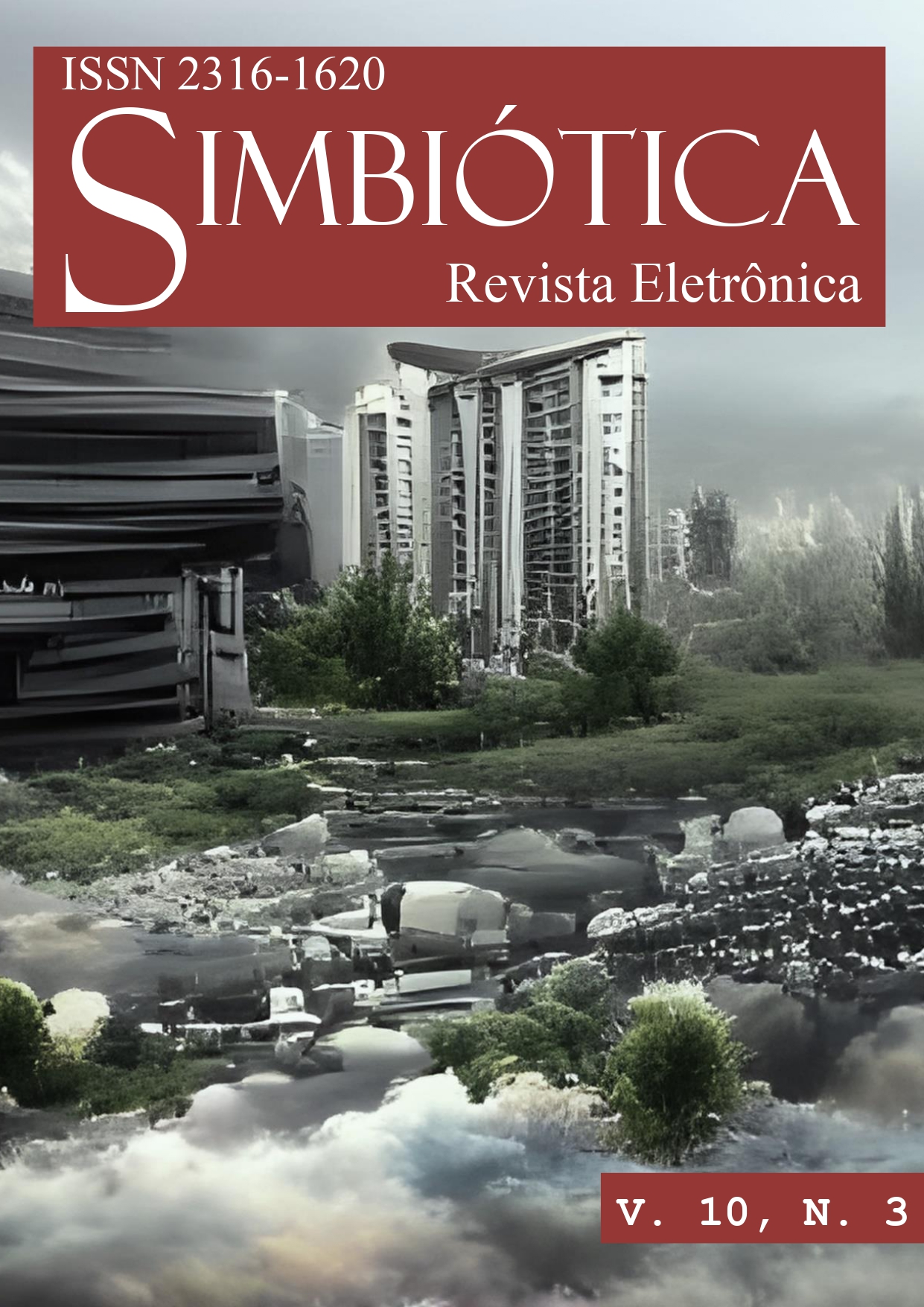Ecofeminism, rights of nature and climate justice: relational webs and planetary restoration
Ecofeminismo, direitos da natureza e justiça climática: teias relacionais e restauração planetária
DOI:
https://doi.org/10.47456/simbitica.v10i3.41072Keywords:
ecological crisis, ecofeminism, nature's rights, climate justiceAbstract
The present work is characterized as a hypothetical-deductive theoretical essay with a bibliographic review, having as a theoretical-conceptual base the contribution of ecofeminism, environmental justice and nature´s right to the realization of climate justice. The work points out correlations between ecological crisis and gender inequalities through different dimensions of ecofeminism: distribution, representation, recognition, capabilities and participation. Climate change affects everybody and everywhere in a cross-border way, but with a lot of differences according to birth place, race, gender, age, sexuality, physical and mental health, socioeconomic conditions, among others intersectionalities. Ecofeminism theory and practices rearticulate the feminists identities promoting an equalization of environmental and climate justice. The feminist perspective adopted in this work permited sociopolitical categories discussions such as ecology, rights of nature, enviromental and climate justice as a gender issue.
Downloads
References
ACHA, Majandra Rodriguez (2016), “How young feminists are tackling climate justice in 2016”. The Huffington Post, n. 7 [Consult. 25-05-2022]. Accessed at https://www.huffpost.com/entry/how-young-feminists-climate-justice_b_9369338
ACHA, Majandra Rodriguez (2020), “Climate justice must be anti-patriarchal, or it will not be systemic”, in R. S. Santisteban et al. (edit). Indigenous Women & Climate Change. Copenhagen, IWGIA, pp. 105-112.
AKOTIRENE, Carla (2021), Interseccionalidade. São Paulo, Jandaíra.
BULLARD, Robert (1993), “Anatomy of environmental racism and the environmental justice movement”. Confronting environmental racism: voices from the grassroots, v. 15, pp. 15-39 [Consult. 25-05-2022]. Accessed at https://cpb-us-e2.wpmucdn.com/sites.uci.edu/dist/c/3308/files/2020/03/Bullard_Anatomy-of-Env-Racism-and-the-EJ-Mov.pdf
CRENSHAW, Kimberlé (2015), “Why Intersectionality Can’t Wait.” The Washington Post, n. 24 [Consult. 04-07-2022]. Accessed at https://www.washingtonpost.com/news/in-theory/wp/2015/09/24/why-intersectionality-cant-wait/
CULLINAN, Cormac (2019), “Nature Rights”, in A Kothari et al. (eds.). Pluriverse: A Post-Development Dictionary. Nueva Delhi, Tulik Books and Authors UpFront, pp. 243-246. [Consult. 12-06-2022]. Accessed at https://radicalecologicaldemocracy.org/%20pluriverse/
GAARD, Greta (2015), “Ecofeminism and climate change”. Women’s Studies International Forum, n. 49, pp. 20-33 [Consult. 12-07-2022]. Accessed at https://doi.org/10.1016/j.wsif.2015.02.004
GAARD, Greta (2017), “Feminism and Environmental Justice”, in R. Holifield, J. Chakraborty, G. Walker, (eds). Handbook of Environmental Justice. London, Routledge, pp. 1-24.
GÊNERO E CLIMA (2022), Quem precisa de justiça climática no Brasil? Observatório do Clima, s. l. [Consult. 11-09-2023]. Accessed at https://generoeclima.oc.eco.br/lancamento-quem-precisa-de-justica-climatica-no-brasil/
GUDYNAS, Eduardo (2020), “Climate change, extractive activities and gender: interlinked crises within development”, in R. S. Santisteban et al. (eds). Indigenous Women & Climate Change. Copenhagen, IWGIA, pp. 43-63.
HUMPHREYS, David (2017), “Rights of Pachamama: the emergence of an earth jurisprudence in the Americas”. Journal of International Relations and Development, v. 20, n. 3, pp. 459-484 [Consult. 25-05-2022].
KLEIN, Naomi (2021), How to change everything: the young human´s guide to protecting the planet and each other. New York, Atheneum books for young readers.
MARTINEZ-ALIER, Joan et al (2014), “Between activism and science: grassroots concepts for sustainability coined by Environmental Justice Organizations”. Journal of Political Ecology, v. 21, pp. 19-60 [Consult. 13-06-2022]. Accessed at https://www.researchgate.net/publication/270635219
MARTINEZ-ALIER, Joan et al. (2016), “Is there a global environmental justice movement?”. The Journal of Peasant Studies, v. 43, n. 3, pp. 731-55 [Consult. 25-05-2022]. Accessed at https://www.tni.org/files/publication-downloads/16-icas_cp_martinez_alier_et_al.pdf
McCANN, Hannah (2019), O livro do feminismo. Rio de Janeiro, Globo.
ROBINSON, Mar (2021), Justiça Climática: esperança, resiliência e a luta por um futuro sustentável. Rio de Janeiro, Civilização brasileira.
SHIVA, Vandana (1989), Staying Alive: women, ecology and development. London, Zed Books.
SETZER, Joana; HIGHAM, Catherine (2021), Global trends in climate change litigation: 2021 snapshot. Londres: Grantham Research Institute on Climate Change, The Environment and the Centre for Climate Change Economics and Policy [Consult. 08-07-2022]. Accessed at https://www.lse.ac.uk/granthaminstitute/publication/global-trends-in-climate-litigation-2021-%20snapshot/
SULTANA, Farhana (2022), “Critical climate justice”. The Geographical Journal, v. 188, n. 1, pp. 118-124.
TOLA, Miriam (2018), “Between Pachamama and Mother Earth: gender, political ontology and the rights of nature in contemporary Bolivia”. Feminist review, v. 118, n. 1, pp. 25-40.
Downloads
Published
How to Cite
Issue
Section
License
Copyright (c) 2023 Verônica Maria Bezerra Guimarães

This work is licensed under a Creative Commons Attribution-NonCommercial 4.0 International License.
Autores que publicam nesta revista concordam com os seguintes termos:
a. Autores mantém os direitos autorais e concedem à revista o direito de primeira publicação, com o trabalho simultaneamente licenciado sob a Creative Commons - Atribuição-NãoComercial 4.0 Internacional.
b. Compartilhar - copiar e distribuir o material em qualquer meio ou formato.
Adaptar - remix, transformar e construir sobre o material para qualquer finalidade, inclusive comercial.
c. Autores têm autorização para assumir contratos adicionais separadamente, para distribuição não-exclusiva da versão do trabalho publicada nesta revista (ex.: publicar em repositório institucional ou como capítulo de livro), com reconhecimento de autoria e publicação inicial nesta revista.
d. Autores têm permissão e são estimulados a publicar e distribuir seu trabalho online (ex.: em repositórios institucionais ou na sua página pessoal) a qualquer ponto antes ou durante o processo editorial, já que isso pode gerar alterações produtivas, bem como aumentar o impacto e a citação do trabalho publicado (Veja O Efeito do Acesso Livre).
Authors who publish in this journal agree to the following terms:
a. Authors retain the copyright and grant the magazine the right of first publication, with work simultaneously licensed under the CCreative Commons - Atribuição-NãoComercial 4.0 Internacional.
b. Share - copy and distribute the material in any medium or format.
Adapt - remix, transform and build on the material for any purpose, including commercial.
c. Authors are authorized to take additional contracts separately, for non-exclusive distribution of the version of the work published in this journal (eg, publish in institutional repository or as a book chapter), with acknowledgment of authorship and initial publication in this journal.
d. Authors are allowed and encouraged to publish and distribute their work online (eg.: in institutional repositories or on their personal page) at any point before or during the editorial process, as this can generate productive changes as well as increase the impact and the citation of the published work (See The Effect of Free Access).














